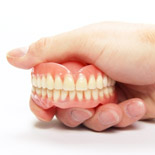 The price tags are high: $1,275 to $2,750 for upper or lower, add a few hundred bucks if you get both, and even partial dentures run between $1,000 and $2,000. Medicare? Yes, it will cover dentures, but you still need to prepare for an out-of-pocket expense of $300 to $600.
The price tags are high: $1,275 to $2,750 for upper or lower, add a few hundred bucks if you get both, and even partial dentures run between $1,000 and $2,000. Medicare? Yes, it will cover dentures, but you still need to prepare for an out-of-pocket expense of $300 to $600.
We’re not trying to scare anyone off. We’re just trying to encourage a deep-dive look into whether dentures are right for you and what to expect if or when you decide they are.
Be wise about the why
Cavities are a form of periodontal disease. When you get a few, fillings are the usual answer. When the number of cavities just doesn’t seem to stop, or when the bone loss is severe enough to warrant extraction, at some point dentures will make sense.
Consult with your dentist, and perhaps even before that, check in with any friends or family who have gone the denture route. What has their experience been? Not everyone’s situation is identical, but there’s bound to be some overlap.
Managing expectations
Dentures can make a vast quality of life improvement for you, especially if you are missing a significant number of teeth. You will want to smile more. You will enjoy chewing food more. You may even notice some lift to you face and cheeks, making you feel younger. Your bank account may even lift a little if you do dentures rather than implants, which can be far more costly.
But just because the teeth are not real, doesn’t mean they are immune to wear and tear. You won’t get a cavity in your dentures, but they still need to be well cared for. Rinsing your dentures after every meal and brushing your dentures regularly are musts. Make sure to use soft-bristled brushes.
Here are some more tips:
- Soak your dentures in a mild soap or a product sold over the counter. Ask your dentist for their preferred brand. But don’t soak them in bleach to make the whiter. It will make the pink gums of the dentures look stained.
- Soak your dentures in cold water. Heat can change their shape just enough to cause discomfort.
- Whenever you take your dentures out, do it carefully. You don’t want them to drop and crack on a porcelain sink or tile floor. In fact, consider placing a soft towel on the floor and sink just in case.
- If your dentures look like they need repair, bring them in to the dentist. It’s not a do-it-yourself fix-it job.
Experience matters
Not all dentists provide dentures to their patients, and even some that do, don’t work regularly with dentures. Experience matters. You know this about life, and the same goes for dentistry.
One type of dentist is called a prosthodontist. This means he or she is just like a regular dentist but has also done extra schooling—typically three years of training—to become a subject matter expert on dental prosthetics. Dentures can have complications, so by choosing a prosthodontist, the odds of having complications goes down.
Those complications can include:
- Chewing difficulty—Dentures are not as effective for chewing as regular teeth in any case. But the better the fit, the more effective they’ll be.
- Pain—Some discomfort your first week or so is normal. But if pain persists or you see sores develop, check with your provider right away.
Time and money
At some point in your search for information about dentures, you’re likely to come across ads promising less expensive one. Be careful. They are often made with less precision, which can lead to major and constant complications, such as pain, sores, and difficulty chewing. With dentures, you get what you—or your insurer—pays for.
Remember that the denture making process takes multiple appointments. If you have to travel well outside your comfort zone, you’ll have to do that several times. Try to find a reputable provider in your town, or a town nearby.







Leave a Reply